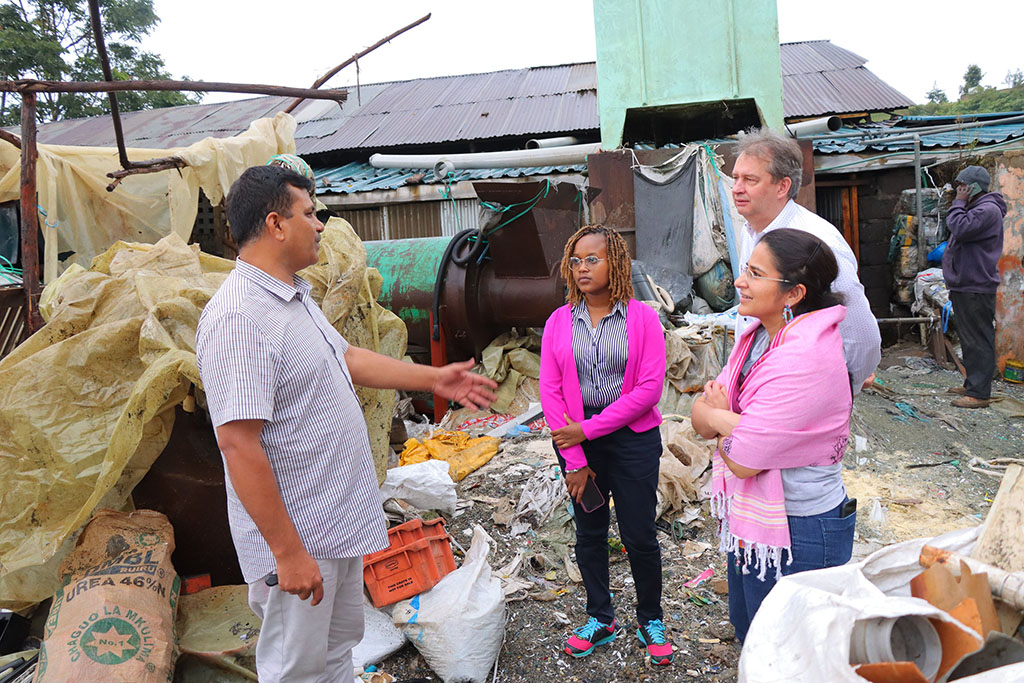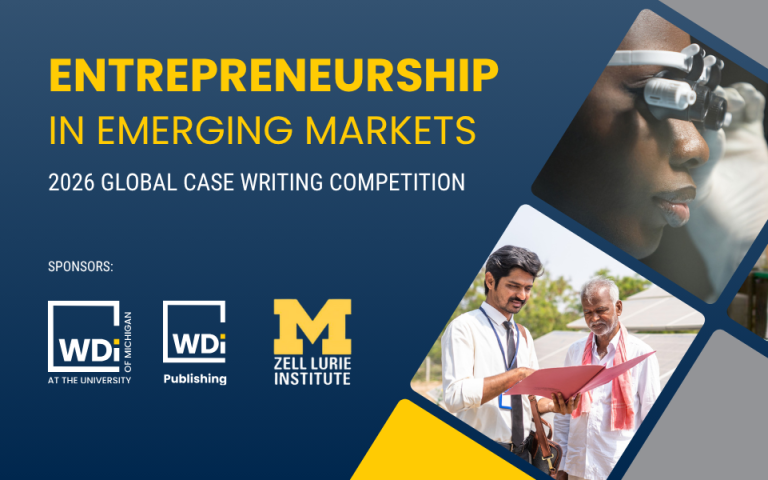IKEA Foundation, KCIC, and WDI staffers meet waste management entrepreneur Muhammad Iqbal at his company, Green Shizuka, in Limuru, Kenya. Image courtesy of KCIC.
Leveraging systems thinking to strengthen collaboration among investors, accelerators and entrepreneurs
Kenya Climate Innovation Center (KCIC) is a World Bank initiative spearheading the role of the private sector in climate change mitigation and adaptation in Kenya. The initiative includes an incubator and accelerator, supporting early-stage companies seeking to safeguard Kenya against the impacts of climate change. These businesses focus on renewable energy, agriculture, waste management, commercial forestry and water. Its Sustainable Waste Innovation for a Future in Transition program, or SWIFT, also targets small- and medium-sized enterprises in the waste management sector. Waste management is a climate change mitigation strategy; for example, diverting organic waste from landfills reduces the production of methane, a potent greenhouse gas.
Funded by the IKEA Foundation, the SWIFT program kicked off in November 2023. It provides business advice, financing, mentorship and technical assistance to 110 enterprises across Kenya. KCIC will also collaborate with the national government and five key counties, including Nairobi, to strengthen waste management policies and incentivize private sector participation in circular economy practices.
KCIC is partnering with the William Davidson Institute at the University of Michigan (WDI) on a three-year, quasi-experimental study to measure the impact of the SWIFT program. “We’re trying to solve compelling and complex problems. And there is always uncertainty when making grants regarding the quality of the intervention and the outside factors that may intervene,” said Nic van der Jagt, monitoring, learning and evaluation manager of employment and entrepreneurship at the IKEA Foundation. “By generating the evidence on the effectiveness of project interventions, we can reduce the risk in our grant making.”
As a research partner in many different sectors and geographies, the Performance Measurement and Improvement (PMI) team at WDI helps businesses and nonprofits harness data to improve operations, inform their strategies and measure impact to achieve commercial success. “Climate-related projects are an increasingly important component of our project portfolio,” said Heather Esper, Director of the PMI team. “We’re well-positioned to apply expertise across sectors, industries and contexts to the complex problems associated with climate change.”
Applying Systems Thinking to Climate Change
WDI is applying principles of systems thinking to this evaluation by collaborating with entrepreneurs, funders, and senior and junior leadership in the design of the evaluation, and engaging in learning. During the research study design phase WDI incorporated perspectives, interrelationships and dynamics of various stakeholders in the theory of change, conceptual framework, indicator selection and survey development.
The process includes speaking with entrepreneurs about what outcomes matter most and limiting the administrative burden on businesses that are already stretched thin. WDI is working to ensure businesses are not burned out from answering too many survey questions — since these businesses often rely on multiple incubators or investors — each of whom make their own unique requests to provide data. Clear communication, conscious analysis of power dynamics, and an eye for bias are integral to a successful decolonized evaluation. To start, however, investors, accelerators and researchers need to shape their goals and practices around the people who will most benefit from these studies and the people from whom the data is requested.
Together, KCIC and WDI are working to develop an evaluation process that is culturally sensitive, stakeholder-inclusive, and accessible. “We are consistently focused on the needs of the enterprises we support and the goals we have for our communities. They are at the center of everything we do,” said Joseph Murabula, CEO of KCIC. “That must also be the case when it comes to research and evaluation, and this partnership with WDI, with their expertise and diligence, is making that happen.”
It’s critical that this research will contribute to the ecosystem and that the knowledge gained from these studies is widely distributed to anyone interested, versus kept behind paywalls. WDI commonly shares its experiences with other research, investment and development stakeholders. It co-creates research with a range of stakeholders, integrates lessons learned into its programming and other active and future projects, and hosts learning sessions that draw a global audience. As an example, WDI recently hosted a free webinar on decolonizing research — with members of this KCIC research project. In the webinar WDI shared practices to break down colonial research structures, empower local voices, and foster true collaboration and inclusivity for groundbreaking impact measurement.
We are consistently focused on the needs of the enterprises we support and the goals we have for our communities. They are at the center of everything we do. That must also be the case when it comes to research and evaluation, and this partnership with WDI, with their expertise and diligence, is making that happen.
— Joseph Murabula, CEO of KCIC
Investing in the relationship with the comparison group
An often under addressed challenge is ensuring adequate and engaged participation from the comparison group. This group consists of businesses that are not part of the SWIFT program but from whom we request data to measure impact. WDI and KCIC are actively incentivizing such enterprises to join the study and share their data. WDI understands the power of partnership and it turned to the KCIC communications, program and evaluation teams, all together, to collaboratively identify what would motivate businesses not in the SWIFT program.
It’s important that participating enterprises also gain something from the experience; in this case, they will get access to a slew of data that we hope will help them shape their business. For example, all participants received a benchmarking report based on the first tranche of data collected in April 2024. Additionally, KCIC is aiming to produce quarterly newsletters that tell stories about entrepreneur journeys and host in-person and online events.
Focusing on Impact: Going Beyond Traditional Key Performance Indicators
Research into whether a particular accelerator and incubator program is successful typically relies on three indicators: revenue growth, job creation, and the ability to raise more funding, among participating companies.
However, on the SWIFT program, WDI’s impact measurement focuses not only on the jobs created but the quality of the jobs generated, compensation, including worker safety and other benefits supporting workers and their families. In addition to revenue, WDI is measuring skill development among workers, customer growth and innovative products and practices. Within capital raising, WDI is digging deeper to understand the financial instruments and investor networks that companies rely on. Additionally, WDI will explore how these outcomes differ by gender given that women are a key stakeholder in the waste management sector.
Ultimately, when research shifts to a more inclusive, comprehensive structure, everyone benefits. Researchers get the most rigorous and truthful data, allowing them to provide more useful analysis. Investors and funders watch their investments grow in the places most ripe for development. Incubators and accelerators find where their efforts create the greatest impact providing them with key insights to inform future strategies to grow businesses in this sector.
“What is really exciting about our research is that we are going beyond key performance indicators to understanding how companies are impacting their local economies and communities,” explained Yaquta Fatehi, program manager, WDI and lead researcher of this project. “Bringing this data to light will help unlock innovation and impact.”



